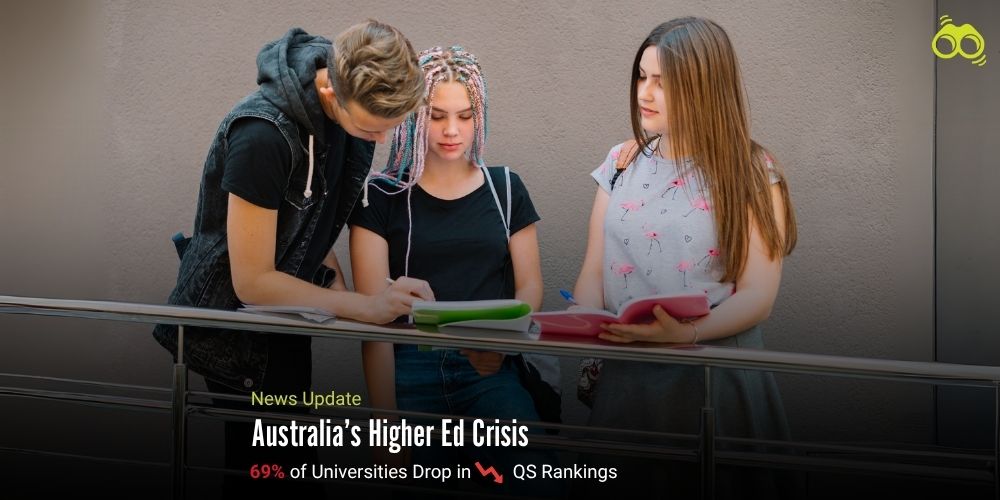Reputation Decline, Policy Shifts Hurt Australia's Global University Standing
QS Rankings 2026: A Wake-Up Call for Australia’s Higher Education Sector
Australia’s position in the global higher education landscape has faced a significant challenge, as reflected in the latest QS World University Rankings. The year proved turbulent for the country’s universities, many of which saw a notable drop in their international standing. While the University of Melbourne remained Australia’s top-ranked institution, it fell seven places to 19th. The University of Sydney slipped from 18th to 25th, and the University of New South Wales moved from 19th to 20th. These declines signalled a broader downward trend that has drawn concern from both educators and policymakers.
Analysts attributed this drop to intensifying competition from Asia-Pacific institutions and wider regional shifts. Of the 36 Australian universities assessed, 25 had declined in ranking, a 69% fall rate that positioned the country just behind Austria and Russia in terms of overall decline. The rankings, based on a vast dataset including millions of academic publications and input from over 127,000 academics, showed the United States maintaining strong performance. In contrast, Australia's results were linked to political uncertainties, international pressures, and tightening student visa regulations.
Angel Calderon, director of strategic insights at RMIT and a member of the QS advisory board, suggested that recent federal discussions around capping international student numbers, coupled with persistent financial difficulties, had weakened the sector. He observed that Australian universities had been experiencing a gradual reputational decline over the past five years, worsened by institutional restructuring, frequent staff turnover, and budget shortfalls, all of which he believed contributed to their waning global image.
The QS system evaluates institutions across several key indicators: academic and employer reputation, teaching quality, research output, international engagement, and, more recently, sustainability. Australia’s performance notably declined in the academic and employer reputation categories, with 20 and 30 universities falling respectively. Nevertheless, Australian universities continued to perform well in research citations per faculty and the presence of international staff. Calderon noted that, while Australian institutions were slipping, universities in China and India were climbing rapidly, supported by increased government and private investment. Meanwhile, four out of New Zealand’s eight universities had improved their rankings, further highlighting the shifting regional balance. The 2026 global top 10 rankings were led once again by the Massachusetts Institute of Technology (MIT), which maintained its first-place position for the 14th consecutive year. It was followed by Imperial College London and Stanford University.
Calderon emphasised that the reputation of Australian universities remained a significant issue, one that had been deteriorating over time. He viewed the situation as a crucial opportunity for institutions to collaborate and focus more meaningfully on student support and engagement. Education experts described the latest rankings as a wake-up call for Australia, urging universities to deliver high-quality education to remain globally competitive and to enhance national productivity. Despite the concerning downward trend, Australia ranked fifth globally in terms of the proportion of institutions within the top 100, with 25% making the list. Nine Australian universities were featured, although five of the prestigious Group of Eight (Go8) experienced a decline. In comparison, Hong Kong and Singapore outperformed, with 56% and 50% of their universities ranked in the top 100, respectively.
QS CEO Jessica Turner raised concerns about the direction of Australia’s higher education sector. She pointed to a decline in reputation and more restrictive government policies targeting international students. Since 2023, Australia has introduced reforms including higher visa fees, tougher English language requirements, and slower processing for applicants from countries deemed “high risk.” Turner observed that international students were increasingly caught up in broader national debates over migration and housing, often being unfairly blamed for wider systemic problems.
She also remarked that Australian universities had faced a difficult year and were now advocating for stable research funding and clearer international education policies. These measures, in her view, were critical to protecting what she described as one of the country’s most valuable national assets, especially in light of intensifying regional competition. Additionally, it was reported that at least seven Australian universities had their research programmes temporarily suspended under the Trump administration, while a dozen were asked to confirm their alignment with U.S. government interests. Vicki Thomson, chief executive of the Go8, commented that such developments—occurring amid global instability and mixed signals from Australia’s primary research partner, the United States, posed a real threat to universities’ ability to fulfil their educational and research missions.
Nonetheless, Thomson acknowledged that Australia continued to exceed expectations on the global stage. She pointed out that having two Go8 universities in the top 20 and six in the top 50 remained a significant accomplishment. However, she stressed that this success must not be taken for granted and should instead be strategically leveraged during these challenging times. In a shifting global landscape, Australia’s universities face a critical juncture, one that demands resilience, reform, and renewed investment in both quality and reputation.
Editor’s Note:
Australia’s decline in the latest QS World University Rankings transcends mere numerical representation; it signifies deeper systemic challenges confronting the nation's higher education sector. For an extended period, Australian universities have substantially depended on international student enrollments and established reputations. However, escalating global competition, stringent visa regulations, and insufficient governmental funding are now eroding this foundational stability. This juncture demands careful deliberation rather than impulsive reactions. The decrease in rankings serves as a cautionary signal, yet concurrently presents an opportunity for recalibration. Instead of pursuing external prestige, our universities ought to reorient their priorities towards core objectives: delivering exemplary education, fostering student success, bolstering research initiatives, and restoring confidence domestically and internationally.
As per Skoobuzz, while rankings are inherently transient, the genuine resilience of a university resides in its personnel, its intellectual contributions, and its societal influence. Australia continues to possess world-class expertise and institutions. The imperative now is to safeguard and cultivate these assets through judicious, long-term strategic planning, eschewing superficial, temporary remedies.














0 Comments (Please Login To Continue)